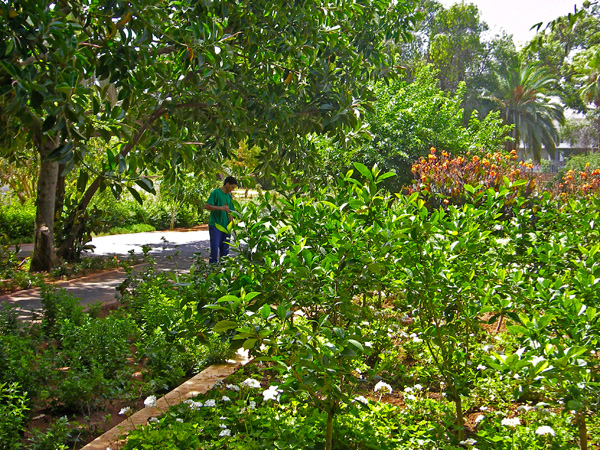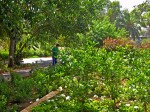The functions of botanic gardens and of their legitimate precursors have gradually evolved to meet the needs of a society that interacts with its natural environment.
The International Agenda for Conservation in Botanic Gardens has drawn up a list of activities carried out by botanic gardens:
- Arboriculture
- Rural and urban planning, resource location and land use
- Conservation biology
- Crop conservation and maintenance
- Dendrology
- Development and enhancement of local and rural community conservation capability
- Environmental education programmes
- Measurement of environmental impact
- Ethno-biological research
- Gene banks
- Herbarium studies and plant taxonomy
- Horticultural research
- Horticultural training
- Integrated pest management
- Laboratory research, including in-vitro plant (tissue) culture
- Library and information services
- Introduction and evaluation of new genetic resources
- Horticulture and ornamental floriculture
- Reintroduction of plants and research on habitat restoration
- Pollution reduction and monitoring programmes
- Public recreation
- Corrective training and therapy
- Seed and tissue banks
- Working networks and conservation working groups
- Systems
- Teacher training
- Tourism
- Research, conservation and ex situ and in situ management of wild plants
Education in botanic gardens should prepare people for the challenges of the coming decades, seriously reviewing today’s mechanisms for development. Agenda 21 (UNESCO 1992) sustains that the only way of ensuring a more prosperous future is by facing up to environmental and development issues in a collaborative, balanced way. This can be done efficiently in botanic gardens by combining environmental education with education for development.
 As explained by Huckle (1990), education for the environment involves informing the general public about the various technologies and social organisations that can help people live in harmony with each other and with the natural environment.
As explained by Huckle (1990), education for the environment involves informing the general public about the various technologies and social organisations that can help people live in harmony with each other and with the natural environment.
With regard to education for development, UNESCO considers that this helps people develop attitudes, skills and knowledge for taking decisions that will benefit themselves and others, now and in the future, and for acting on such decisions.
Bearing these definitions in mind, it is difficult to conceive environmental education and education for development as belonging to two different fields. Global knowledge of environmental education inevitably leads to development considerations.
The function of Botanic Gardens
Another way of studying the value of botanic gardens is by considering their functions in societies today.
Not only do botanic gardens embellish cities and serve as tools for research and conservation of plant diversity, but they also have a special role in the context of Islamic culture and civilisation, a role that has existed for centuries.
Gardens as places for reflection and progress
 Islamic culture, based on its sacred texts and its spiritual and literary works, has always considered nature to be a divine gift and a source of reflection and development. Because of their profound respect for nature, throughout history Muslims have created beautiful gardens for contemplation and enjoyment. Such gardens can be found today in Spain, Syria, Turkey, Iran and the Maghreb.
Islamic culture, based on its sacred texts and its spiritual and literary works, has always considered nature to be a divine gift and a source of reflection and development. Because of their profound respect for nature, throughout history Muslims have created beautiful gardens for contemplation and enjoyment. Such gardens can be found today in Spain, Syria, Turkey, Iran and the Maghreb.
Gardens with their activities and functions provide a tool for promoting a trend that exists in the Muslim world today, although it is not yet a widespread trend, towards building what some people describe as an Islamic Theology of Nature, or Green Islam as it has been named in some philosophical and scientific circles. This Green Islam advocates ecology as an essential element in belief.
Many Arabs and Muslims belong to international environmental organisations but the average Arab-Islamic ‘man in the street’ sees conservationism as another of the notions being imposed by the West to prevent Muslim countries from developing their economic potential. There is, therefore, a pressing need to integrate and associate Islamic principles with environmental conservation practices in Muslim-majority countries. It is also important to create awareness among young Muslims and reconcile them with their cultural roots which, far from turning away from progress, promote it while encouraging responsible use and management of natural resources.
This post is available in: English Español


